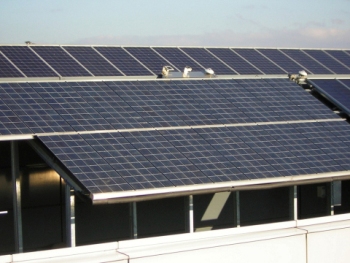Feb 14 2014
Kyocera Corporation announced today that its solar modules installed at the Fraunhofer Institute for Solar Energy Systems (ISE) have been independently tested and their performance levels verified, showing an exceptional output even after 10 years of operation.
 Kyocera solar modules installed at Fraunhofer ISE (forefront) (Photo: Business Wire)
Kyocera solar modules installed at Fraunhofer ISE (forefront) (Photo: Business Wire)
Europe’s largest solar research institute in Germany, ISE installed a test system with the Kyocera modules equipped with high-precision measuring equipment that confirms an output degradation of just five percent after a full decade of maximum use. Researchers regularly analyze operating data and check the output of random modules annually in Fraunhofer ISE’s test lab, which have determined the Kyocera KC 125G modules still deliver excellent results.
“The low output degradation of five percent over the past 10 years is evidence of the excellent quality of Kyocera solar modules. We are already eager to see the measurements following the next period. In the past five years, we have measured stable efficiency in the lab as well as the field, so we expect the result to be just as good in terms of quality,” said Anselm Kröger-Vodde, Project Manager for Photovoltaic Modules, Systems and Reliability at Fraunhofer ISE. Kyocera is one of the few companies on the market to maintain a vertically integrated production system. This system allows full monitoring of product quality at each step which helps ensure the performance of every cell and solar module over an extended period of time.
Kyocera is also one of the few makers of solar modules on the market to possess such long-term studies of its products under real-life conditions. A similar test system is located just outside of Tokyo, Japan and has been in operation for almost 30 years. The most recent measurements, taken five years ago, revealed a degradation of just 9.6 percent. With such real-world data to stand on, Kyocera is confident in offering its customers a 25-year guarantee of 80 percent of nominal output.